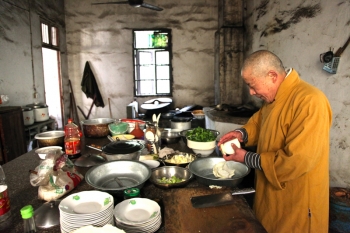This seems like a far stretch from chanting and deep meditation dressed in crisp yellow robes within the temple halls but it is all part of a normal day at our temple at Tian Mu Shan China. Of course, there are the latrines to clean, guest bed rooms to be swept and sheets to be washed and hung out to dry. The daily routine in a temple or monastery may not seem so different from the daily routine in most households throughout the world. In our Buddhist practice it is very easy to lose sight of this. There will always be dishes to wash and garbage bins to put out, shopping to do and cooking meals. This is the juice of ordinary life. I call it kitchen spirituality.
There is a well-known Ch’an saying: “Before enlightenment, chop wood. After enlightenment, chop wood”. The simple and ordinary things are equally as important as the deeper studies of sutra study, chanting and meditation on our journey to enlightenment. It is these ordinary tasks that can quite often frustrate us and daunt us. Yet at the same time it is these ordinary tasks that are the testing ground for the meditation that has gone before. If we find it hard to deal with the ordinary things of life how much more difficult is it to deal with the more challenging issues that so often confront us? This is the real test of our meditation – not whether we can sit for one, two, three or more hours in meditation but whether we can perform the ordinary tasks with an awakened and serene mind.
I was aware of the chopping sound as the cleaver sliced the ginger against the wooden board. Close by was Zhi Chang chanting “amituofo” with each careful peeling of the turnip. I turned to look at him with a gentle smile. His return grin reached from ear to ear. He then broke out into chanting the San Gui Yi (The Three Refuges). We chanted together.
The winter had continued bearing down upon us. It snowed heavily one night. The following morning the taps in the guest area were well and truly frozen over. There was no water for the guests and no water to flush the latrines. I made my way up the path leading through the bamboo forest to the well to draw water. The bamboo was all hunched over with the weight of the snow on the branches. The snow had built a hard and heavy crust on the stone cover to the well so I was unable to lift it. I returned to the dormitories and enlisted the help of another monk. Together we shovelled the snow off the stone slab, removed it and lowered the bucket attached to a rope. The rope began to slip between our gloves. We had to remove the gloves to get a better grip on the rope. It was -15c. Within seconds our hands froze. The pain became immeasurable. Ju Hui did not speak but I could notice the pain in his eyes. We hauled up the water together chanting Namo Amituofo at full volume to allay the pain. It was something we seemed to do instinctively. I noticed his fingers were cracked from long exposure to the freezing temperatures. As we began to draw up the third bucket his fingers began to bleed. We continued to chant. The chanting seemed somehow to give us strength and a warmth. Together with bamboo poles across our shoulders we carried the water back down the hill trying to avoid slipping in the snow. Finally there was water to boil for tea and other household duties.
I reflected back on that winter morning. The practice was instinctive to us and helped us endure the hardships. Of course, hardships are relative. We each have our burdens to carry throughout the day either emotional ones of physical ones. Most often they happen during those ordinary times of getting the kids ready for school, doing battle with the peak hour traffic, paying the household bills and more. In our Pure Land Buddhist practice we have the chant of “Namo Amituofo” (Homage to Amidha Buddha). It can become for us as a mantra to give us strength, courage, endurance and patience during those ordinary times. Sometimes it is hard just to concentrate on our breathing as we are struggling with the issues at hand. It is often easier to chant and remain focused on the chanting and the name of Amidha Buddha. Each moment in the ordinary times of our day can become a moment for practice.
Back to Features















